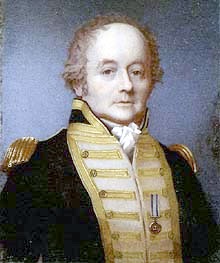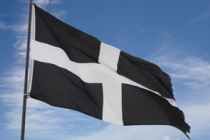William Bligh - Captain of HMS Bounty, magnificent seaman

William Bligh was born on 9 September 1754 at St Tudy, Cornwall.
Bligh first went to sea in 1762 – at the tender age of 7, as a Captain’s personal servant on board HMS Monmouth. He joined the Royal Navy in 1770 where he served on HMS Hunter and became a Midshipman in 1771 serving on HMS Crescent and HMS Ranger. He was an intelligent man, well-versed in science and mathematics and was also a talented writer and illustrator. He became Sailing Master on the Resolution, commanded by Captain James Cook, quite an achievement as he was only 22 years of age. This voyage ended with the death of Cook on February 14th 1779 in Hawaii (known at that time as the Sandwich Islands).
In 1787 aged 33, he was given command of ‘The Bounty’, a three year old merchant ship, his mission was to transport breadfruit from Tahiti to the West Indies. Various books and films have portrayed him as a villain, a violent and unpleasant man – but is this the truth? Commanding a ship required a man of strong character, his crew would have comprised of mostly illiterate men, probably recruited by the press-gangs and he was most likely no better or worse than any other commander of his time.
The Bounty set sail on December 23rd 1787.
In April 1789 the famous mutiny took place, led by Bligh’s one-time friend, Fletcher Christian.
Bligh and 18 other crew members loyal to him were set adrift on April 28th in the Bounty’s launch, an open boat, 23-foot long by 6’9” wide. In most cases such an act would have led to certain death for the men aboard, but Bligh was a magnificent seaman and he sailed from Tofua, one of the Friendly Islands, landing in Timor, Java, without any loss of life on June 14th. The journey of 3618 nautical miles took them 47 days.
The mutineers, meanwhile, continued on to the Pitcairn Islands where Fletcher Christian and eight others founded a colony which remained undiscovered until 1808. (Descendants of the mutineers still live on Pitcairn.)
Bligh eventually returned and his career in the Navy continued, seemingly unaffected by the mutiny. In 1790 he became Captain of the sloop HMS Falcon, followed by service on HMS Medea and HMS Providence. In 1792 he again visited Tahiti and successfully transported breadfruit to the West Indies.
In 1797 he commanded HMS Director at the battle of Camperdown and as Captain of HMS Glatton in 1801 took part in the battle of Copenhagen, after which he was commended for his bravery by Admiral Nelson. Also in 1801 Bligh was elected a fellow of the Royal Society, in consideration of his distinguished services in navigation, botany etc.
In 1805, Bligh was sent to New South Wales as Governor, but once again his oppressive manner contributed to an uprising, in Sydney in 1808 – the Rum Rebellion - he had attempted to end the use of rum as a form of currency. The rebellion was led by one John Macarthur, a pioneer and wool merchant originally from Stoke Damerel, Devon who became a leader of settlers in New South Wales. The British soldiers mutinied and Bligh was forcibly deposed by Major George Johnston of the 102nd foot and imprisoned for two years. On his release he returned home where he was cleared of all blame and Major Johnston was tried at Chelsea Hospital in 1811 and cashiered. Bligh was promoted to
Rear Admiral and in 1814 became a Vice Admiral.
In the latter years of his life, Bligh lived at the Manor House, Farningham, Kent and died on 7th December 1817, aged 64, in Bond Street, London. He is buried in the eastern part of Lambeth churchyard, by the side of his wife by whom he had six daughters.
This article has been kindly provided by Kernow Matters to Us and is the fourth in a series on Famous Folk of Kernow (Cornwall).
- Cornish
- English
- Log in to post comments





